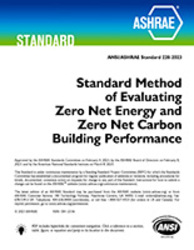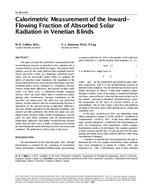Indoor air quality is determined by the sources of the contaminants and by the methods used to control their concentrations. To predict or mathematically assess the quality of air to which occupants may be exposed, the rates of generation, transfer, and removal of contaminants are characterized. Spatial models are also discussed, which can be used to calculate contaminant distributions within occupied spaces.
Methods used to predict concentrations of indoor contaminants are commonly based on single-zone steady-state models of occupied spaces. These models are briefly reviewed and their limitations are discussed. The models are extended to include multizone and unsteady effects to improve their accuracy. Analytical and finite-difference solutions for the models are also discussed.
This paper concludes with identification of needed improvements of these models, including better characterization of the dynamics of contaminant generation and better characterization of the devices used with various control strategies.
Product Details
- Published:
- 1983
- Number of Pages:
- 14
- File Size:
- 1 file , 1 MB
- Product Code(s):
- D-DC-83-12-1
- Note:
- This product is unavailable in Russia, Belarus


